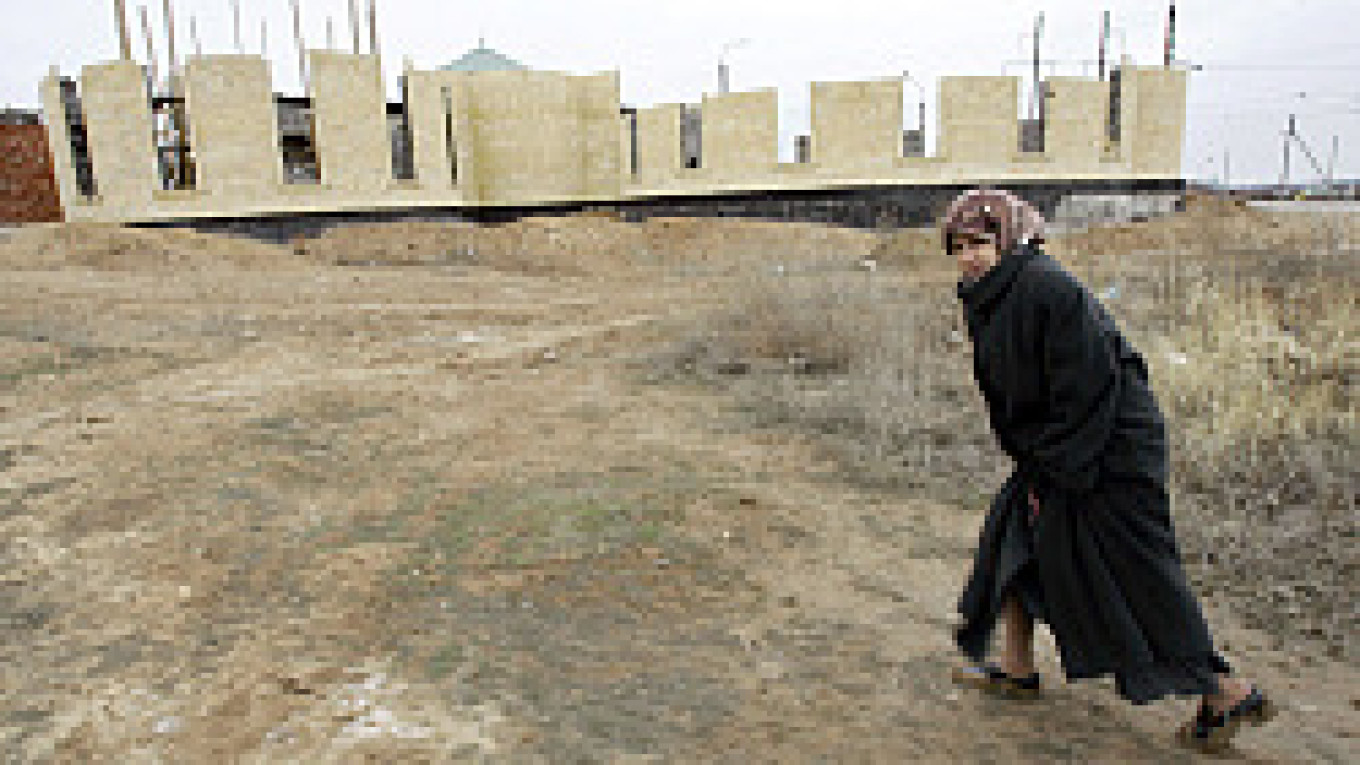It is a partially built mosque that the region's half-million Muslims dream will one day be capped by a 37-meter-high minaret atop ornate arches and serenely flowing fountains.
But city authorities say zoning regulations have been violated, and they plan to raze the building this spring. That has angered Muslims and rights advocates who say freedom of religion is being trampled in an atmosphere of xenophobia fed by the more than decade-long war against Islamic militants and separatists in Chechnya.
"Astrakhan is historically a Muslim city. Will we return to the communist times, when they destroyed churches and mosques?" said local human rights activist Veronika Karpycheva.
Muslim Tatars ruled the Astrakhan region up to the 16th century, and today around half the province's 1.1 million inhabitants are Muslim.
Yet, only five functioning mosques are left in the provincial capital after decades of Soviet-era repression. Two historic mosques are in ruins. Other mosques in Astrakhan, a center of Russia's sturgeon industry some 200 kilometers upriver from the Caspian Sea, were put to secular use as libraries or drug stores during the Soviet era.
Local Muslim businessmen have begun restoring the once-ornate, 19th-century brick building that housed the White Mosque in Astrakhan.
The new mosque that lies unfinished outside the city has been conceived as a grander place of worship, and it too is being financed by local business leaders.
Plans to construct it across the road from a large Muslim cemetery on a 600-square-meter plot of land were originally laid in 1998. The city administration granted a permit three years later.
But lack of money held up construction. After a new governor and mayor took office in 2004, licensing officials did an about-face. Last summer, just months after work finally began thanks to a major fund-raising effort, the Muslim community received an order to halt the project.
A municipal court in January rejected their appeal and a higher tribunal upheld that decision on March 1 -- giving the Muslim community two months to dismantle the structure or face the bulldozers.
Alexander Verkhovsky, director of the religious rights watchdog Sova, said officials appeared to be annoyed that the planned mosque complex -- which foresees a large, domed prayer hall, an Islamic school and three small buildings for ritual washing -- would occupy such a prominent location, at a gateway to the city.
"There is a struggle for identity. The authorities in Astrakhan believe the city is ethnic Russian and therefore Orthodox Christian, so mosques should be out of public view," he said.
The city administration dismissed such suggestions. Andrei Semyonov, head of the city administration's legal department, said municipal planners had overlooked safety concerns when they originally approved the project.
"The construction site is in a danger zone. There are high-voltage electricity lines in the area, and if there is a strong wind, they could collapse and kill all the people inside," he said.
But Muslims in the neighborhood, who currently pray in a small tower at the construction site that is also threatened with destruction, are not prepared to back down.
The mayor's office denied them permission to hold a rally outside City Hall. They plan to organize a protest in Moscow next month in a bid to get the attention of national policymakers.
"Inshallah [God willing], all-powerful God will help us," said the mosque's administrator, Asya Makhmutova, her hands clasped in a gesture of prayer.
But she said she was discouraged by the lack of support from Astrakhan's Muslim leader, Mufti Nazymbek Ilyazov. The region's Muslim leadership has refused to get involved in the dispute -- leaving it up to the mosque's local community to fight an unequal battle with the authorities.
Ilyazov declined repeated requests for an interview, but his deputy expressed unease with the situation.
"All the necessary permissions exist, but our authorities are determined to have it destroyed," Deputy Mufti Ildar Nur-Mukhamedov said. "The mayor is cold to us."
The controversy has reinforced concerns about the unequal status of the country's 20 million Muslims, who make up some 14 percent of the nation's population, and the disenchantment of rank-and-file believers with their official leaders -- many of whom were trained in Soviet times, leaving them unable to speak Arabic and purportedly unfamiliar with Islamic teachings.
The discord has intensified with the recent radicalization of Muslims in the Caucasus region, due in part to the Chechen wars and Islamic extremist terror attacks in Russia, and come to affect relations even between ethnic Russians and the traditionally moderate Tatar Muslims of the Volga.
Mahkmutova, who wears an Islamic-style headscarf covering her hair and mud-spattered boots to negotiate the construction site, said she and the others were ready to defend the mosque with their bare hands if an ultimate appeal to the Supreme Court failed.
"I love my country, Russia. Why should we feel like second-class citizens?" she said angrily.
A Message from The Moscow Times:
Dear readers,
We are facing unprecedented challenges. Russia's Prosecutor General's Office has designated The Moscow Times as an "undesirable" organization, criminalizing our work and putting our staff at risk of prosecution. This follows our earlier unjust labeling as a "foreign agent."
These actions are direct attempts to silence independent journalism in Russia. The authorities claim our work "discredits the decisions of the Russian leadership." We see things differently: we strive to provide accurate, unbiased reporting on Russia.
We, the journalists of The Moscow Times, refuse to be silenced. But to continue our work, we need your help.
Your support, no matter how small, makes a world of difference. If you can, please support us monthly starting from just $2. It's quick to set up, and every contribution makes a significant impact.
By supporting The Moscow Times, you're defending open, independent journalism in the face of repression. Thank you for standing with us.
Remind me later.


